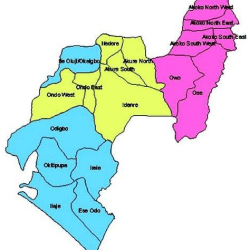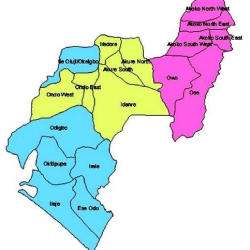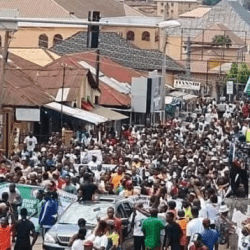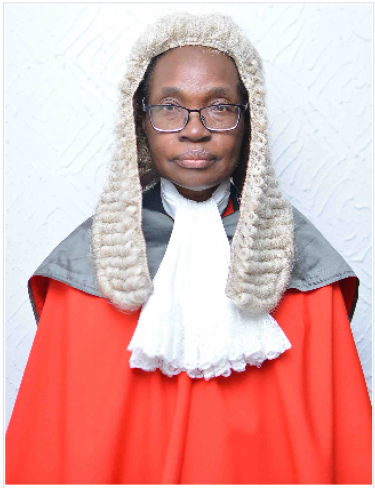Ondo State is located in the Southwestern geopolitical zone of Nigeria and bounded in the North by Ekiti and Kogi States, in the East by Edo State, in the west by Osun and Ogun states and in the south by the Atlantic Ocean. Ondo State is located entirely within the tropics.
The State is peopled predominantly by Yorubas who speak various dialects of the Yoruba language such as the Akoko, Akure, Apoi, Idanre, Ikale, Ilaje, Ondo and the Owo and a minority speaking the Ijaw Language. Ondo State, which is indeed a microcosm of the Nigerian nation, is blessed with resourceful, industrious and hospitable people. Her crop of educated elite has led to its being classified as one of the most educationally advanced states in Nigeria. The people are mostly subsistence farmers, fishermen and traders.
The life patterns of the people represent an embodiment of culture, ranging from the local foodstuff to the mode of dressing, dancing, wood crafts, such as, carved house posts and decorated doors. The culture of the Ondo State people speaks volume. In the variety and quality of it’s traditional sculptures and cultural ceremonies, Ondo State is rich and well endowed. The people are lovers of arts, music and literature. The arts and crafts of the state are dependent on the products of its luxuriant vegetation for the raw materials: wood, bamboo, calabash carvings etc.
The ivory carving, bronze and brass work and wood carving from Owo is basically Yoruba and sculptures excavated at Egberin Street in the town in 1971 showed the naturalistic art of classical life. The carved house posts and decorated doors from Owo and Idanre are among the best known internationally. Small-scale museums of antiquities are to be found in parts of the state, mostly in the palaces of traditional rulers who are the custodians of the people’s rich culture and ancient traditions. The palace of the Deji of Akure is for instance a national monument where relics of the Yoruba’s past can be found.
Ondo State is richly blessed with varied and favourable ecological and climatic conditions with vegetation ranging from mangrove swamps to the southern coastal riverine areas through the rainforest of the mid-lands to the derived savannah in the northern part of the state. The southern zone supports fishing activities and the production of tree crops such as cocoa, rubber, oil – palm, cashew and forest trees like teak, gmeligna and indigenous tree species.
The tropical climate of the state is broadly of two seasons: rainy season (April-October) and dry season (November – March). The temperature throughout the year ranges between 21oC to 29oC and humidity is relatively high. The annual rainfall varies from 2,000mm in the southern areas to 1,150mm in the northern areas. The State enjoys luxuriant vegetation with high forest zone (rain forest) in the south and sub-savannah forest in the northern fringe.
There is a maze of numerous rivers, creeks and lakes in and around Ondo State with very prominent rivers like Owena, Ala, Oluwa, Oni, Awara, Ogbese and Ose. Generally, the land rises from the coastal part of Ilaje, Ese-Odo and Okitipupa areas to highlands and steeps down at the Northern parts of the state.
More on Ondo State
Official Name
Ondo State of Nigeria

Appellation
Sunshine State
Date of Creation
February, 1976

State Capital
Akure
Festivals
Ogun, Olokun, Igogo, Egungan, Ajagbo, Orosun, Arigiya, Boat Regatta and Mare.
Population
3,460,877 comprising 1,745.057 Male and 1,715,820 female(as at 2006)
Languages
Yoruba, Ijaw and English (Official Language) and several dialects of the sub-groups.
People
The indigenes are predominantly Yoruba namely: the Akoko, Akure, Apoi, Idanre, Ijaw, Ikale, Ilaje, Ondo and the Owo. Ondo crop of educated elites has led to its being classified as one of the most educationally advanced states in Nigeria. The people are mostly subsistence farmers, fishermen and traders.
The life pattern of the people represents an embodiment of culture, ranging from the local foodstuff to the mode of dressing, dancing, wood crafts, such as carved house post and decorated doors. The Culture of Ondo State people speaks volume. Antiquities and artifacts are also preserved in palaces of traditional rulers some of which have been declared as National Monuments.
Location
The state lies between longitudes 4″30″ and 6″ East of the Greenwich Meridian, 5″45″ and 8″ 15″ North of the Equator. This means that the state lies entirely in the tropics.

18 Local Government Areas
Ondo State, made up of 18 Local Government Areas is located in the South Western Zone of Nigeria.

Boundaries
Ondo state is bounded in the North by Ekiti/Kogi State; in the East by Edo State; in the West by Oyo and Ogun States and in the South by the Atlantic Ocean.
Land Area:
14,788.723 square kilometers.
Vegetation
The state enjoys generally, luxuriant vegetation. A high forest zone (or rain forest) is found in the south, while the northern fringesis mostly sub- savannah forest.
Climate
The climate is tropical with two distinct seasons viz the rainy season (April-October) and the Dry season (November-March). The temperature through out the year ranges from 21C-29C while humidity is relatively high. The annual rain fall varies from 2.000mm in the southern parts to 1150mm in the northern areas. The rainfall decreases in amount and distribution from the coast to the hinterland.
Natural resources
Extensive fertile soil suitable for agriculture with sub- savannah forest suitable for cattle gazing in the Northern fringes. Vast forest resources, variety of timber species e.g Teak, Gmelina, Masionia e.t.c. Ondo State is the largest producer of Cocoa in Nigeria. Other cash crops grown in the state include rubber, cashew, kolanut, palm oil etc.
Mineral resources
Oil and Gas; Ondo State produces 12% of Nigeria’s total output, other mineral resources found in the state are quartz sand, clay, granite, limestone talc, kaoline, coal, columbite, rock, tin, bitumen. ( the second largest deposit in the world ) many rivers, ocean fronts, and the longest coast line in Nigeria.
Tourism sites
Idanre hill tourism centre at idanre Mountain Climbing and cultural festival (Mare) that holds every December in idanre. Ebomi lake at Ipesi in Akoko South East Local Government Area, coast creeks and canals, Igb Olodumare at Oke igbo, iho-Eleeru (cave of ashes) at Isarun in Ifedore Local Government Area
System of government
Constitutional democracy in a Federal Republic with elected Executive and Legislature and an Independent Judiciary.







